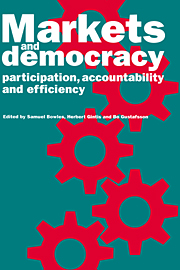Book contents
- Frontmatter
- Contents
- List of figures
- List of tables
- Preface
- 1 Post-Walrasian political economy
- Part I Agency, incentives, and democratic accountability
- Part II Institutions and institutional change
- Part III Conditions for the success of the democratic firm
- Part IV Productivity, distribution, and power
- Part V Ownership, participation and capital markets
- Part VI Political democracy and economic democracy
- 17 Investment planning in market socialism
- 18 Capitalism and democracy: a summing up of the arguments
- Bibliography
- Author index
- Subject index
18 - Capitalism and democracy: a summing up of the arguments
Published online by Cambridge University Press: 05 March 2012
- Frontmatter
- Contents
- List of figures
- List of tables
- Preface
- 1 Post-Walrasian political economy
- Part I Agency, incentives, and democratic accountability
- Part II Institutions and institutional change
- Part III Conditions for the success of the democratic firm
- Part IV Productivity, distribution, and power
- Part V Ownership, participation and capital markets
- Part VI Political democracy and economic democracy
- 17 Investment planning in market socialism
- 18 Capitalism and democracy: a summing up of the arguments
- Bibliography
- Author index
- Subject index
Summary
Introduction
The possible connection between economic and political systems is one of the great issues of classical political economy. However, the subject is not much discussed by straight economists today, nor does it typically appear in contemporary economics courses.
This is too bad. The topic of “capitalism and democracy” is obviously of enormous general importance in its own right. Furthermore, the possible connections have lately become a more immediately operational issue. Without some sense of the logic behind possible relations between capitalism and democracy it is very difficult to understand many aspects of the economic “reforms” now taking place in formerly orthodox socialist countries. The connection between the economic and political spheres in the area of socialist reforms is usually of overpowering significance, typically overshadowing straight economic aspects of reform even for narrowly posed economic issues.
Advocates of free market economics, like Hayek and Friedman, have long perceived and articulated a link between capitalism and freedom or democracy. Now there is new evidence from the recent experiences of the former USSR, Eastern Europe, China, and other reforming socialist countries, and also from newly industrialized capitalist countries like Korea and Taiwan, hinting that capitalism and freedom or democracy tend to “go together.”
In view of its importance, even for an understanding of straight economic issues, it is somewhat puzzling that mainstream economists have not devoted more professional research to the linkage problem. Perhaps one reason has to do with the technical difficulty of formalizing the ways capitalism and democracy might be connected.
- Type
- Chapter
- Information
- Markets and DemocracyParticipation, Accountability and Efficiency, pp. 306 - 315Publisher: Cambridge University PressPrint publication year: 1993
- 2
- Cited by

